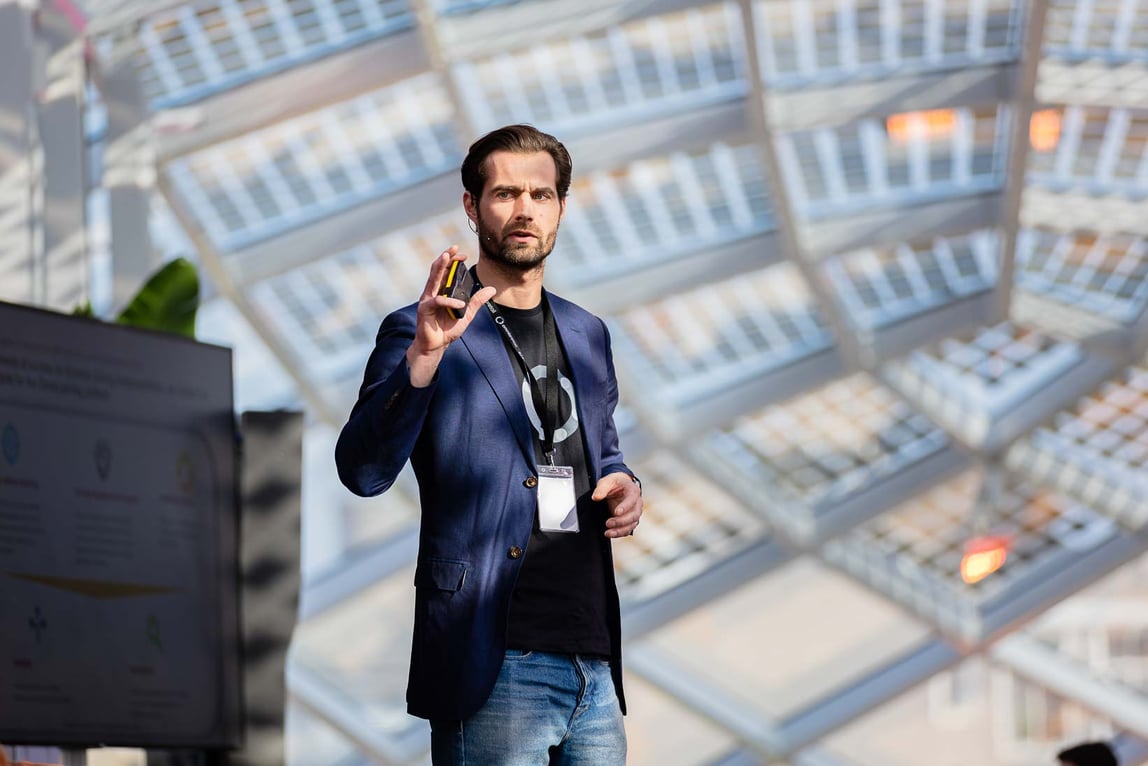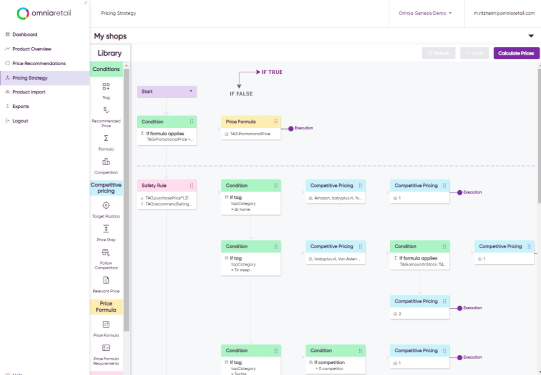We sat down and spent some time with one of Europe's greatest minds in e-commerce and digital marketing. Antoine Brouwer, he shared his thoughts with Omnia Retail on e-commerce in 2022, his forecast, thoughts on trends and challenges in retail and the importance of pricing.
Omnia Retail: Thank you for joining us for this prelude into the world of e-commerce and retail. We would like to kick off with an introduction of yourself.
AB: I’m Antoine Brouwer, 49-years old and I live in Amersfoort. I studied International Business in Den Hague and Advertising and Marketing in Pforzheim, Germany. I started my career at Ben in the Netherlands. I was one of the first 40 people that joined the company and started there with wholesale marketing. The company was bought by Deutsche Telekom and became T-Mobile. In 2003-2004, we needed to integrate a webshop and that became my first experience with e-commerce, in telecommunications. I built this up for T-Mobile in the Netherlands and then I was asked to move to Germany to the headquarters in Bonn. I lived in Germany for two years and set up the entire digital marketing strategy for T-Mobile, T-Home and T-Online Germany. After two years, I moved back to the Netherlands and then I became director of e-commerce for UPC; currently Ziggo. I started there on my own and built an e-commerce department for about 3-4 years. After ten years, I wanted to do something else, I moved to retail and I went to work for MediaMarkt and became responsible there for marketing and e-commerce.
Omnia Retail: What triggered your move to the retail industry?
AB: I had already done everything in telecommunications and in my field of marketing and e-commerce. I thought, okay, what are the other interesting segments that are big in e-commerce? Retail and specifically MediaMarkt were a great opportunity for e-commerce. I developed the whole marketing department and e-commerce side there and this was my first touch-point with Dynamic Pricing in 2011. I then went on to work for Blokker holdings (a large non-food retail chain in NL), back then they had 11 retail chains and around 125 people managing e-commerce for the whole group. We grew revenue in four years’ from €30 million to €300 million, which was a huge success. There were so many brands and there was a real need for dynamic pricing. I had built everything myself for MediaMarkt and thought to myself, ‘I don't want to do that again’. So I reached out to Connective Power (today Omnia Retail) and that’s how we became one of the first big multi-portal customers, with brands like Bart Smit, Intertoys, Blokker, LeenBakker, and Xenos. After I left Blokker, I was then asked to become CEO of fonQ. We had fonQ NL, BE and DE and I was there for two years, which was an even wider role. Then, I decided it was again time for something else. So in May 2020 I left the company in the midst of covid-19, and moved to Greece for a year. I became the executive director of two main plays in Greece, Public and MediaMarkt and again, set up the marketplace, e-commerce strategy, and team organisation, the proverbial life of a consultant.
Omnia Retail: It’s clear that you know the need for Dynamic Pricing well. Related to all your experience in the retail industry, what is your view on this field is for the future?
AB: I see a number of shifts. On the one hand, you really see the platform economy growing, so you really see the Amazons of Europe, on a global level, becoming bigger and bigger. In the Netherlands you see it with Bol.com and on the other side, there are a lot of verticals that are coming back. An example here is Coolblue, in the past they had like 100 different URLs I think, and then they merged it all into Coolblue. But they started with all kinds of specialist verticals which was mainly because of SEO. Now you see a lot of specialists coming in, which have a broad and in-depth assortment of a specific category, and they have the best content, the best pictures, the best advice in order to really specialise in one thing.
The other thing that you see is that e-commerce is becoming more cross-border. In the last year, 14.9% of all e-commerce in the Netherlands was already coming from other European countries; an interesting prospect because you have omni-channel players competing with each other in different markets where they're not in the same offline market, but they are competing online over country borders. Hence I believe it's becoming more and more important, especially also due to covid that e-commerce grows in terms of data quality. Meaning, getting the best prices right but also creating the best content in terms of pictures,specifications, and attributes. It has become more and more important that all these things are correct because the more competition you have, the more you can't compete on price alone anymore.
Omnia Retail: Do you think this is heavily impacted by the situation we were in over the past two years with the COVID 19 pandemic?
AB: I saw a report over the whole of Europe that you actually see a lot more growth. Especially if you look at the Netherlands, there was hardly any growth in e-commerce revenue in 2020 with only 4%. However, if you take out online purchases within travel, e-commerce revenue was up 30%. I think it made a big step forward, but the bigger question is now, how will this remain? Do you really attract new customers who have never bought online before? In an evolved country like the Netherlands, U.K. or Germany, especially not that many people have never been online before and there might have been a small bit of an uplift, the key here is what are all these e-commerce companies going to do with the data they were able to collect across the ‘new’ customer base that they attracted. Can they continue to target them? I don't believe there will be a big shift from offline to online, with people suddenly not going to stores anymore.There will definitely be an increase in the future split between online adn traditional stores, but nothing as big as we’ve seen over the past two years. The growth will not be linear.
Omnia Retail: You described some changes in e-commerce that we saw over the last two years. Do you foresee any challenges with these changes?
AB: That depends whether you are an omni-channel, pure player or offline entity. If you're mostly offline, and there are many companies that hardly have any online presence at all. Then the bigger the shift to e-commerce the more difficult it gets. But overall, competition online has gotten tougher over the last year and that will have its effect that people compete more on price.
Omnia Retail: So the largest overall challenge for retailers that you see, is the large competition in the market?
AB: Yeah, it's the competition. In 2021, you really saw the difficulty in that there was a limit in the supply chain. Couriers couldn't handle the volumes anymore, suddenly having to scale up for almost a year without any planning or warning. It really has shown that there's a limit to the volume that can be handled in terms of infrastructure, transportation options and the volume of deliveries that can be delivered to people’s homes, so scaling up overnight is not an easy or viable solution. One that also has an effect on sustainability, something I see myself that I have way more boxes at home than I used to before, because everything is delivered in a carton box.
Omnia Retail: That is something I noticed as well. Would you yourself say that your behaviour has changed a lot when it comes to online shopping, compared to pre-pandemic?
AB: Not for me, as I’ve always been in e-commerce, hence I like to buy online, also due to my curiosity, to see what other check-out processes look like, for example.
Omnia Retail: Of course, there is also a difference for people living in cities, compared to rural areas.
AB: Yes, indeed. When I was living in Athens, for instance in 2021, the couriers there couldn't handle our packages anymore. So we decided to hire taxi drivers. We had around 500 taxis driving around delivering our packages to customers. We built software and we gave it to the drivers, which they could use on their phones, and then we agreed on rates for the delivery service.
Omnia Retail: That sounds like a smart solution, win-win for everyone.
AB: The drivers were happy to earn money, we were happy our packages were delivered and the customers were happy to receive them on time.
In part two (here) we continue our conversation with one of Europe’s top e-commerce and digital marketing minds, Antoine Brouwer.

.png?height=766&name=ORA%20Visuals%2020252026%20(11).png)



